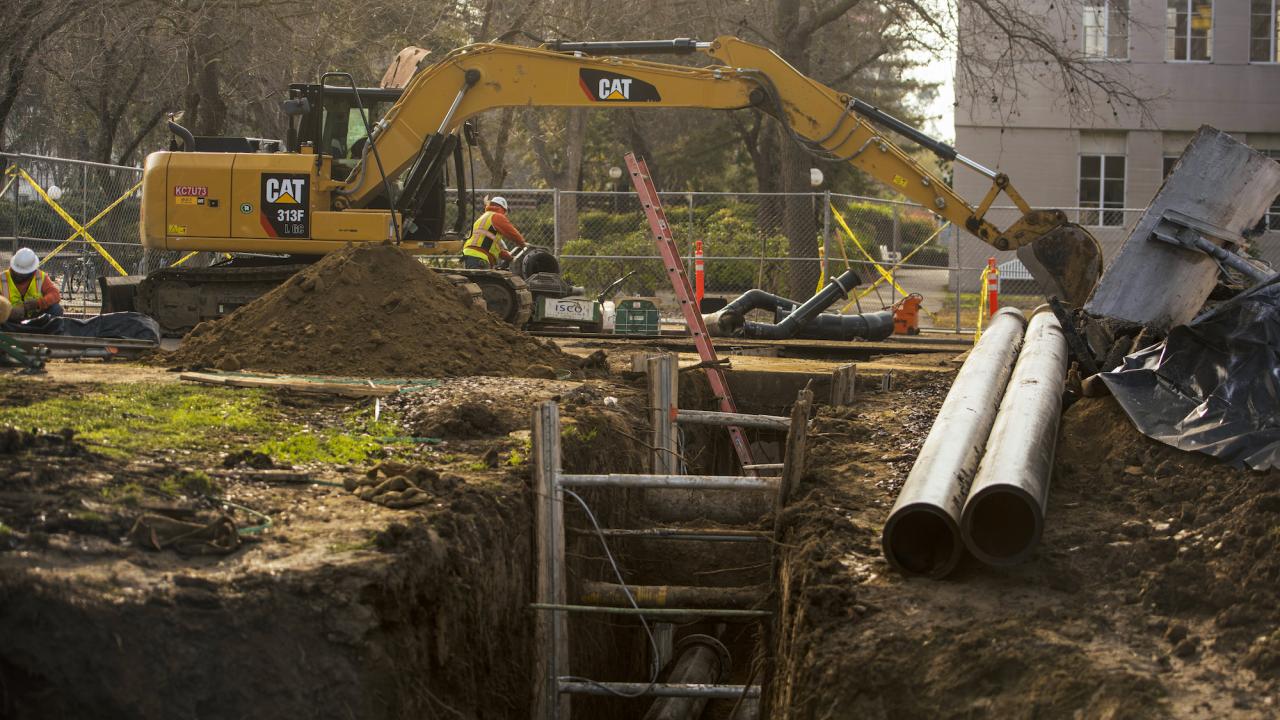
Provide Feedback on Campus Fossil Fuel-Free Plan
Submit comments by Oct. 27
UC Davis, the first in the UC system to draft a roadmap for eliminating fossil fuels from its operations, now has a plan for public comment. University community members are invited to review the Fossil Fuel Free Pathway Plan and provide feedback through the end of October.
Provide your feedback!
Review the public draft of the UC Davis Fossil Fuel-Free Pathway Plan and submit your comments below.
“The university operates like a mid-sized US city. We maintain our own utilities, run a bus system offering services to both the campus and the city, on top of that we house energy-intensive science labs,” said Camille Kirk, director of Sustainability and co-chair of the Campus Advisory Committee on Sustainability, or CACS. “All of these contribute to our fossil-fuel usage.”
“Our journey to develop this plan began with a 2010 Climate Action Plan and from there, we’ve spent a decade in planning, studies and execution,” Kirk said. “Our catalyzing moment to pull it all together, though, was rooted in a petition a year and a half ago.”
In November of 2021, a group of students, faculty and staff launched a petition for a fossil-fuel free UC Davis. In response to the petition, Chancellor Gary S. May charged CACS with developing a plan to end the use of fossil fuels at the university. This effort to mitigate the university’s contribution to climate aligns with UC Davis' decades-long commitment to sustainability leadership, innovation and supporting the community and world at-large.
For the last year and a half, the members of the committee have been hard at work exploring the many facets of the university’s fossil fuel consumption and finding the best avenues to reduce or eliminate them. The result is a plan that provides tangible actions, proposed dates, estimated costs and measurable goals that take into account climate justice, risk reduction and the development of new technologies.
The plan was split into chapters, each identifying core opportunities and proposing solutions on different source areas of fossil fuel usage, such as district energy, stand-alone buildings and fleet. Each chapter was assigned a staff lead author who consulted subject matter experts including faculty members. The plan outlines solutions totaling to $1 billion and a timeline of the elimination of approximately eighty percent of the 2019 baseline fossil-fuel use by 2030, and ninety five percent of the 2019 baseline fossil-fuel use by 2040.
Stewarding sustainability
The Campus Advisory Committee on Sustainability has several advisory charges, including improving sustainability performance and engagement and promoting inclusivity in sustainability programs. Members include faculty and staff across the university with a wide range of expertise and experience.
District energy accounts for 75 to 80 percent of the university’s business operations emissions. A part of the solution proposed in the chapter is the ongoing Big Shift project, which is replacing the fossil fuel-based heating infrastructure on the Davis campus with one that uses electricity – a renewable resource. “The Big Shift is massive in its scope and it’s a critical part of our fossil free plan for the future,” said Jim Carroll, university architect and associate vice chancellor of Design and Construction Management and co-chair of the CACS.
Read more about the challenges and proposed solutions for fossil fuel reduction in the plan.
Engaging with the campus community was an integral part of the process from the beginning. CACS and the Office of Sustainability hosted town halls, tabling events, stakeholder meetings and published a webpage on the Fossil Fuel-Free Pathway Plan, or FFFPP, to ensure people had the opportunity to be informed and involved.
Feedback is being accepting through October 27, 2023. Next, the committee will review submissions and provide the plan to Chancellor May to steward the university toward a fossil fuel-free future. If you want to track progress of the plan and other sustainability engagement opportunities subscribe to the Sustainable UC Davis newsletter.
